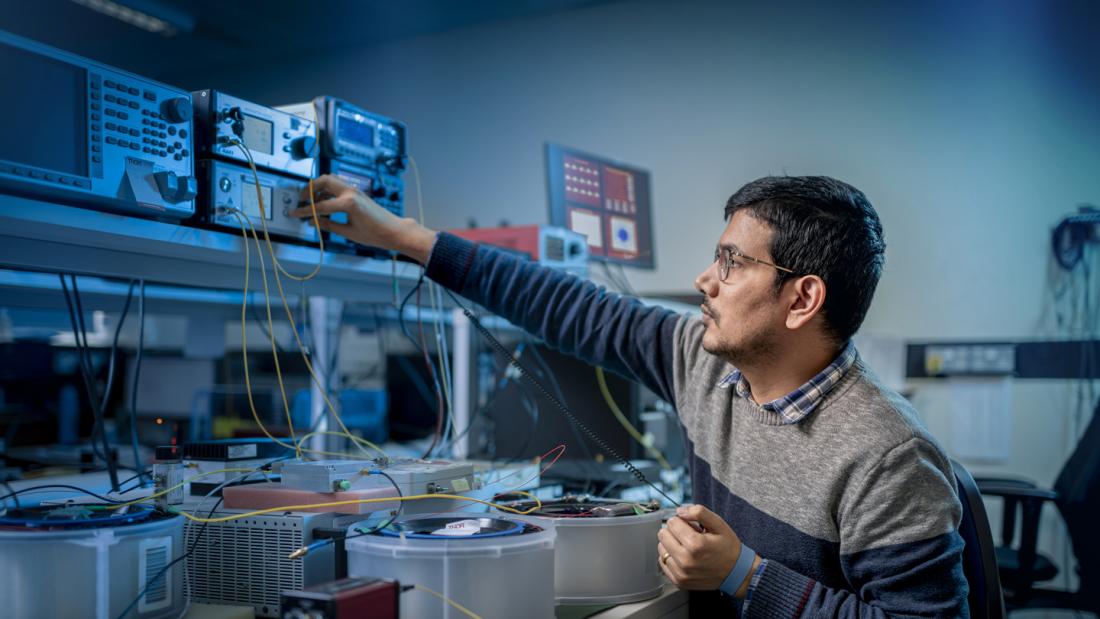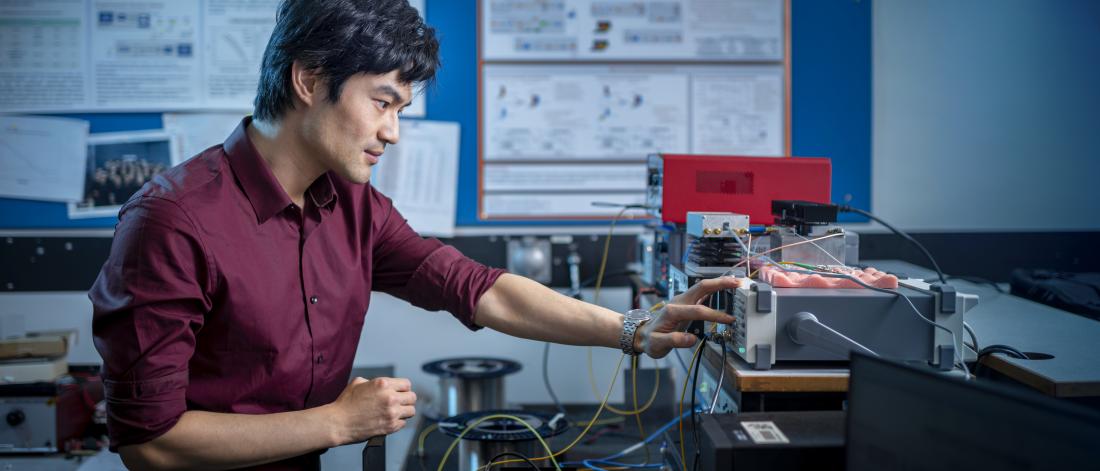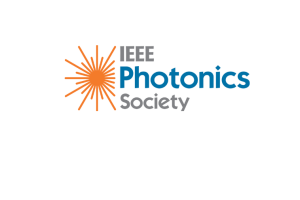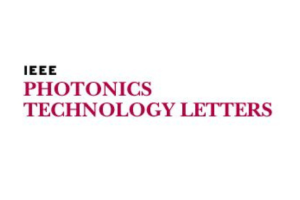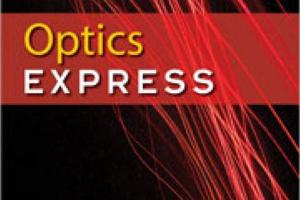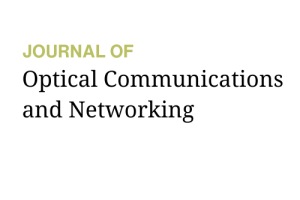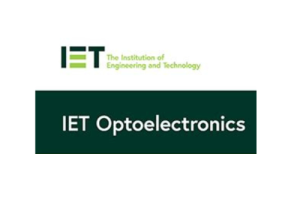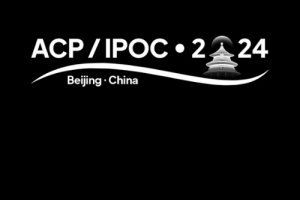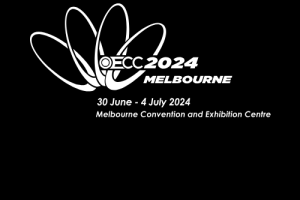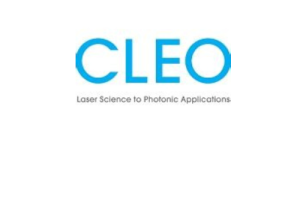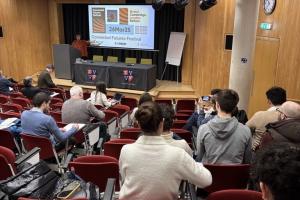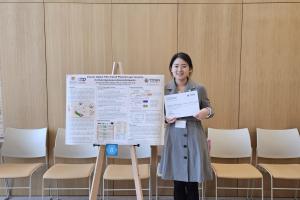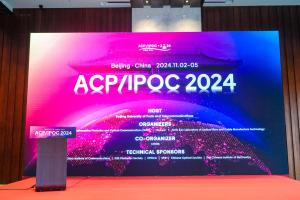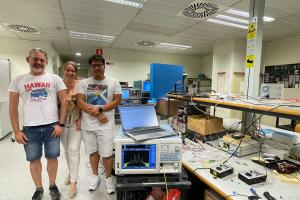
Digital Signal Processing (DSP) is a vital enabling technology in the modern world that has vast uses across key sectors, including healthcare, defence and security, transport and the environment.
Our vision is to work with partners across the world in order to develop DSP-based technologies that deliver benefits for individuals, communities and businesses across North Wales, and beyond. We believe in making digital communication systems more accessible, more convenient and more secure, so that all individuals and communities can benefit.
Our long-term vision is to develop into a Welsh and UK Government-backed National Centre for DSP Technology, which will have greatly expanded research activities, technology commercialisation activities and DSP skills training at various levels. Thus, ultimately our ambitions are to contribute significantly to the growth of the technology industry in Wales, leading to an increase in high-tech jobs in Wales, attracting companies to the region, developing supply chains and offering high-tech careers to Wales’ young up-and-coming researchers and engineers.
The DSP Centre of Excellence was established in 2019, with £3.9 million investment from the European Regional Development Fund (ERDF) awarded by the Welsh European Funding Office (WEFO). The DSP Centre builds upon the research into digital communications within the University that began in 2006 by the Optical Communications and Research Group (OCRG).
The overall goal of the DSP Centre is to collaborate with academic and industrial partners on research, development and innovation (RD&I) projects in the DSP field. During the WEFO funding period, we led six projects focussing on:
- DSP algorithm design, optimisation and implementation.
- Flexible transceivers and networking devices.
- Optical and wireless transmission system convergence.
- Cloud network architecture.
- Software defined networking (SDN)-based network control.
- 5G and beyond testbed establishment and field trials.
In 2022, we were awarded an additional £3 million funding from the North Wales Growth Deal (NWGD), through Ambition North Wales, Welsh Government and UK Government. This funding is designed to help build upon and enhance the research we've carried out so far, through the purchase of state-of-the-art telecommunications equipment. Our specific objectives for the NWGD funding are to:
- Encourage innovation and commercialisation through knowledge transfer from the DSP Centre to the wider economy, by working on 70 collaborative projects/ collaborations.
- Establish the DSP Centre as a recognised centre, by 2031, contributing to UK Government objectives for 5G roll out.
- Directly create 10 sustainable, high-value jobs in the digital sector through research excellence and indirectly support 30 jobs.
- Increase GVA by £11 million - £13 million.
- Leverage £12.5m further investment through grant capture and private sector contributions.
Now, we have successfully captured additional funding from various private and public funding schemes. Each of our newly-captured projects aspire to meet the objectives of the NWGD project above, and will allow us to expand our research activities and turn our focus to exploring how we move our research and technologies to market, to fully harness the commercial and societal benefits of DSP-enabled technologies. You can find more about these in the 'Projects' section below.
We collaborate with academics, research institutions and industry experts around the world, to carry out research projects and develop technologies. We have established a strong partner base consisting of local and global telecommunications organisations with expertise covering the whole ICT value chain. At present, we have over 50 partners engaged in joint research projects.
Our partners include:
The DSP Centre is located within the School of Computer Science & Engineering.
Our labs host a suite of cutting-edge specialist equipment worth £3.5 million (which will increase beyond £5.5 million in 2024), including four pairs of high-speed Arbitrary Waveform Generators (AWGs), Digital Storage Oscilloscopes (DSOs), state-of-the-art augmented and virtual reality head-mounted displays, as well as a vast range of other components and supplies that facilitate our research. This high-speed equipment enables us to have full capacity of developing:
- >40GHz bandwidth dual-polarisation coherent optical transmission systems
- >10GHz bandwidth real-time optical communication systems
- >40GHz point-to-point/multi-point IMDD metro/access optical networks
- Gigahertz bandwidth 5G/6G millimeter-wave wireless communication systems
- >25GHz optical wireless communication systems
- physical layer secure optical communication systems
- fibre optic sensing systems
- data-driven, immersive visualisation experiences
We are in the process of developing our state-of-the-art 5G Innovation Lab, ready for 2024, which will house a unique 5G testbed facility with a >40km optical fibre-based metro network. The Innovation Lab will act as a base for collaboration and innovation activity with our partners to explore and field trial market applications of our technologies. Our goal is that the Lab will help to grow the local digital economy, through the transfer of our breakthrough technologies into industry products and services.
Digital Signal Processing (DSP) refers various software-based techniques for improving the accuracy and performance of digital communications.. This includes complex operations including filtering, equalization, compression and modulation to generate, or detect, a signal of superior quality.
So many of the devices we use in our daily lives are powered by DSP technologies. From mobile phones, smart watches, headphones, smart assistants like Alexa, to hearing aids, MRIs and X-rays, DSP technology is all around us. And it often goes unnoticed as it helps our lives run more seamlessly, with little impact.
Key features & benefits
DSP is used extensively in communication networks, because of its inherent advantages. Current communication networks (including 3G and 4G) are struggling to meet the needs of new services and technologies in the modern world, such as high-definition video, streaming, gaming, remote working, as well as Virtual Reality. In addition, network traffic continues to grow exponentially, and customers' demands for super-fast, stable and secure connection are increasing.
This is where DSP-comes in. DSP algorithms are the brain of mobile networks, such as 5G and beyond. They make these networks:
- superfast
- intelligent
- highly reliable
- highly secure
- low energy consumption
- low cost
- able to support a high number of devices at the same time.
Overall, DSP-based technologies have inherent advantages over analog-based technologies, meaning they are able to support communication demands.
Real-life applications
However, DSP is not just used in communications systems. Because of its key features, DSP is a versatile technology that permeates numerous other domains, including:
- Health and Social care (e.g. remote GP appointments and x-rays)
- Transport and Logistics (e.g. traffic monitoring and road maintenance)
- Environment and Energy (e.g. monitoring air-quality and undersea disturbances)
- Housing (e.g. low carbon materials and low energy devices)
- Defence and Security (e.g. ultra-secure encryption)
Wider socioeconomic and wellbeing impacts
DSP technologies also play a key role in supporting the socioeconomic and wellbeing agendas, by promoting:
- Digital inclusion and connectivity (by ensuring equality of access to broadband and services now moving online, such as education, access to government departments and democratic participation)
- Town and city centre regeneration and renewal (by helping to create connected and 'smart' cities)
We research and develop Digital Signal Processing (DSP)-based technologies and optical communication systems.
The focus of our research is on DSP-based techniques for 5G (and beyond) mobile networks and their ecosystems. We explore techniques to drastically improve their functionalities, such as signal transmission and bandwidth, that are designed to meet the demands from both the user and operator's perspective. Some of the essential new features we are researching include:
- Dynamic network reconfigurability and convergence
- Adaptability for optimum transmission and network performance
- Security of information transmission and network infrastructure
- Additional functionalities based on data-carrying signal sensing
- Dynamic bandwidth allocation with fine granularity to support a wide diversity of traffic types
- Network slice-ability to create independent logical networks on a common physical infrastructure
- Backwards compatibility for ease of technology migration
- Energy aware systems.
We also conduct research into other cutting-edge DSP-based techniques, and are currently focussing on:
- Distributed Fibre Optic Sensing (DFOS)
- Physical Layer Security Optical Networks (PLSON)
- 5G-based Data Visualisation and Virtual, Augmented and xReality (VR/AR/XR)
- High Speed Visible Light Communications (VLC/Li-Fi)
We have developed four portable, experimental demonstrators for the above technologies, located in our DSP Centre Innovation Laboratory, that allow for real-time viewing of these pioneering techniques. We are currently working on integrating these four prototypes, to produce a unique, upgradeable, integrated network platform capable of supporting multiple 5G/6G use cases.
Our DSP technologies not only have high academic value, but also huge commercial potential. As a result of their innovative features, they have significant potential applications across a wide range of sectors.
We have invented a now globally-accepted DSP-based signal transmission concept, termed 'adaptively modulated Optical Orthogonal Frequency Division Multiplexing (OOFDM)', achieving a series of 12 ground-breaking experimental demonstrations of real-time high-speed OOFDM transceivers. These real-time demonstrations are enabled by a number of DSP-based symbol synchronisation and clock signal generation techniques, also invented by our researchers. This pioneering work resulted in Fujitsu’s commercialisation of the OOFDM technique for data centres. OFDM as a key technical enabler is currently being used in 4G/5G and Wi-Fi and would also be indispensable for realising future 'Green' Air-Space-Ground Integrated Networks.
We are currently exploring opportunities to take the techniques we've developed and transform them into real-life products and services on the market, so that the benefits are available to all sections of our community in North Wales, and beyond. To do this, we work with industry partners to increase the Technology Readiness Levels (TRLs) of our technologies, working together to move our research, to proof of concept and field trials, to fully commercial products available for consumers.
We have a range of ongoing collaborations with industry experts in communications, environment, and defence and security, including:
- ADRA Low Carbon Hub - to explore use of of our optical sensing technology for use in environmental monitoring applications. See more here.
- Compound Semiconductor Centre and Comtek - to explore the creation of a 'Made in Wales' supply chain capability for digital devices to ensure that the socioeconomic benefits of digital research in Wales remain within communities in Wales.
- National Grid - to explore our optic sensing technology for use in power cable security cable monitoring.
- Offshore Catapult - to explore our optic sensing technology for use in undersea cable monitoring.
- Defence organisations - to explore use of our physical layer security and optical wireless communications/LiFi to detect cyber attacks.
We host and deliver skills training courses to students and technology companies, to share our expertise in digital signal processing (DSP).
Our aim is to develop digital training courses ranging from L4 to L7 to students, researchers and technology companies in North Wales. This will contribute significantly to the growth of the technology industry in Wales, leading to an increase in high-tech jobs, attracting companies to the region, support companies to bring their products to market and offering careers to Wales’ young up-and-coming researchers and engineers.
See our News & Events section for more information on past and upcoming training events.
Journal Publications
2024
- Gonem, O, Giddings, R & Tang, J, 'Experimental Demonstration of Soft-ROADMs with Dual-Arm Drop Elements for Future Optical-Wireless Converged Access Networks', Journal of Lightwave Technology, vol. 42, no. 6, pp. 1773-1785. https://opg.optica.org/jlt/abstract.cfm?uri=jlt-42-6-1773
- Osahon, I., Kostakis, I., Powell, D., Meredith, W., Missous, M., Haas, H., Tang, J., & Rajbhandari, S., ‘Neural Network Equalisation for High-Speed Eye-Safe Optical Wireless Communication with 850 nm SM-VCSELs’, Photonics, 11(8), Article 772. https://doi.org/10.3390/photonics11080772
- Huang, Y, Chen, X, Shen, W, Wei, Z, Hu, C, Deng, C, Wang, L, Zhang, Q, Chen, W, Zhang, X, Chen, L, Jin, W, Tang, J & Wang, T, 'Sidelobe Suppression Method with Improved CLEAN Algorithm for Pulse Compression OTDR', IEEE Photonics Technology Letters, vol. 36, no. 22. https://doi.org/10.1109/LPT.2024.3465501
- Vallejo Castro, L., Gonem, O., Jin, W., Faruk, M. S., Giddings, R., Yi, X., & Tang, J. (in press). ‘Experimental Investigation of a Seamlessly Converged Fiber-Wireless Access Network Employing Free-Running Laser- and Envelope Detection-based mmWave Generation and Detection’, Optics Express.
- Vallejo Castro, L., Gonem, O., Jin, W., Giddings, R., Chen, L., Huang, Y., Yi, X., Faruk, M. S., & Tang, J. (in press). ‘Seamlessly Converged Fiber-Wireless Access Networks with Dynamic Sub-wavelength Switching and Tunable Photonic mmWave Generation’, Journal of Lightwave Technology.
- Jin, W.; Chen, L.; He, J.; Giddings, R.P.; Huang, Y.; Hao, M.; Faruk, M.S.; Yi, X.; Wang, T.; Tang, J. ‘Concurrent Direct Inter-ONU and Upstream Communications in IMDD PONs Incorporating P2MP Flexible Optical Transceivers and Advanced Passive Remote Nodes’, Photonics 2024, 11, 1021. https://doi.org/10.3390/photonics11111021
- Torres-Ferrera, P, Faruk, MS, Kovacs, IB & Savory, SJ 2024, 'Parallel Adaptive Equalizer for Alamouti-Coded Signals Recovery in Simplified Coherent PON', IEEE Photonics Technology Letters, vol. 36, no. 10, pp. 633-636. https://doi.org/10.1109/LPT.2024.3385572
- Mansour, M, Faruk, MS, Laperle, C, Reimer, M, O’Sullivan, M & Savory, SJ 2024, 'Physics-Based Modeling for Hybrid Data-Driven Models to Estimate SNR in WDM Systems', Journal of Lightwave Technology.
- Kovacs, IB, Faruk, MS, Torres-Ferrera, P & Savory, SJ 2024, 'Simplified coherent optical network units for very-high-speed passive optical networks', IEEE Journal of Optical Communications and Networking, vol. 16, no. 7.
- Chen, L, Wang, X, Jin, W, Huang, X, Yang, G, Jiang, M & Tang, J 2024, 'Point-to-point intensity modulation and direct detection flexible transceivers incorporating cascaded inverse fast fourier transform/fast fourier transform-based multi-channel aggregation/de-aggregation techniques', IET Optoelectronics, vol. 18, no. 1-2, pp. 41-47. https://doi.org/10.1049/ote2.12115
- Hao, M, He, W, Liang, S, Jin, W, Chen, L & Tang, J 2024, 'Modulation Format Identification Based on Multi-Dimensional Amplitude Features for Elastic Optical Networks', Photonics, vol. 11, no. 5. https://doi.org/10.3390/photonics11050390
2023
- Chen, X. Huang, W. Jin, X. Wang, G. Yang, M. Jiang, Y. Huang, and J. Tang, ‘Analyzing Peak-to-Average Power Ratio Characteristics in Multi-Channel Intensity Modulation and Direct Detection Flexible Transceivers Deploying Inverse Fast Fourier Transform/Fast Fourier Transform-Based Processing’, Sensors 2023, 23, 9804, December 2023, doi 10.3390/s23249804
- I. N. O. Osahon et al., ‘Experimental Demonstration of 38 Gbps over 2.5 m OWC Systems with Eye-safe 850 nm SM-VCSELs’, Photonics Technology Letters, doi: 10.1109/LPT.2023.3337943.
- O. F. A. Gonem, R. P. Giddings, and J. Tang, “Experimental Demonstration of Soft-ROADMs with Dual-Arm Drop Elements for Future Optical-Wireless Converged Access Networks,” Journal of Lightwave Technology, Oct. 2023, doi: 10.1109/JLT.2023.3328771.
- A. Batch, S. Shin, J. Liu, P. Butcher, P. D. Ritsos, and N. Elmqvist, “Evaluating View Management for Situated Visualization in Web‐based Handheld AR,” Computer Graphics Forum, vol. 42, no. 3, pp. 349–360, Jun. 2023, doi: 10.1111/cgf.14835.
- L. Vallejo et al., “Demonstration of M-QAM OFDM bidirectional 60/25 GHz transmission over 10 km Fiber, 100 m FSO and 2 m radio seamless heterogeneous fronthaul link,” Optical Fiber Technology, vol. 77, p. 103161, May 2023, doi: 10.1016/j.yofte.2022.103161.
- L. Vallejo, J. Bohata, J. F. Mora, S. Zvánovec, and B. Ortega, “Remote mmW photonic local oscillator delivery for uplink down-conversion in DML-based optical hybrid C-RAN fronthaul,” Journal of Optical Communications and Networking, vol. 15, no. 6, p. 357, May 2023, doi: 10.1364/jocn.482085.
- M. Hao, X. Jiang, X. Xiong, R. P. Giddings, W. He, and J. Tang, “Low-Complexity Modulation Format Identification Based on Amplitude Histogram Distributions for Digital Coherent Receivers,” Photonics, vol. 10, no. 4, p. 472, Apr. 2023, doi: 10.3390/photonics10040472.
- T. Tyagi, R. P. Giddings, and J. Tang, “Real-Time Demonstration of Concurrent Upstream and Inter-ONU Communications in Hybrid OFDM DFMA PONs,” IEEE Photonics Technology Letters, vol. 35, no. 3, pp. 148–151, Feb. 2023, doi: 10.1109/lpt.2022.3227369.
- S. Shin, A. Batch, P. Butcher, P. D. Ritsos, and N. Elmqvist, “The Reality of the Situation: A Survey of Situated Analytics,” IEEE Transactions on Visualization and Computer Graphics, pp. 1–19, Jun. 2023, doi: 10.1109/tvcg.2023.3285546.
- L. Chen, W. Jin, J. He, R. P. Giddings, Y. Huang, and J. Tang, “A Point-to-multipoint Flexible Transceiver for Inherently Hub-and-Spoke IMDD Optical Access Networks,” Journal of Lightwave Technology, pp. 1–12, Jan. 2023, doi: 10.1109/jlt.2023.3249406.
- S. Hu et al., “Adaptive Hybrid Iterative Linearization Algorithms for IM/DD Optical Transmission Systems,” Journal of Lightwave Technology, pp. 1–7, Jan. 2023, doi: 10.1109/jlt.2023.3243917.
2022
- J. Zhang et al., “Capacity and flexibility improvement of traffic aggregation for fixed 5G: Key enabling technologies, challenges and trends,” China Communications, vol. 19, no. 12, pp. 1–13, Dec. 2022, doi: 10.23919/jcc.2022.12.001.
- T. Tyagi, R. Giddings, and J. Tang, “Real-time experimental demonstration of a computationally efficient hybrid OFDM DFMA PON,” Optical Fiber Technology, vol. 74, p. 103106, Dec. 2022, doi: 10.1016/j.yofte.2022.103106.
- J. He, R. P. Giddings, W. Jin, and J. Tang, “DSP-Based Physical Layer Security for Coherent Optical Communication Systems,” IEEE Photonics Journal, vol. 14, no. 5, pp. 1–11, Oct. 2022, doi: 10.1109/jphot.2022.3202433.
- F. M. Alsalami, O. C. L. Haas, A. Al-Kinani, C.-X. Wang, Z. Ahmad, and S. Rajbhandari, “Impact of Dynamic Traffic on Vehicle-to-Vehicle Visible Light Communication Systems,” IEEE Systems Journal, vol. 16, no. 3, pp. 3512–3521, Sep. 2022, doi: 10.1109/jsyst.2021.3100257.
- X. Jin et al., “Error-Controlled Iterative Algorithms for Digital Linearization of IMDD-Based Optical Fibre Transmission Systems,” Journal of Lightwave Technology, vol. 40, no. 18, pp. 6158–6167, Sep. 2022, doi: 10.1109/jlt.2022.3191415.
- H. Jiang, N. He, X. Liao, W. O. Popoola, and S. Rajbhandari, “The BER Performance of the LDPC-Coded MPPM over Turbulence UWOC Channels,” Photonics, vol. 9, no. 5, p. 349, May 2022, doi: 10.3390/photonics9050349.
- S. Hu et al., “Multi-constraint Gerchberg-Saxton iteration algorithms for linearizing IM/DD transmission systems,” Optics Express, vol. 30, no. 6, p. 10019, Mar. 2022, doi: 10.1364/oe.448826.
- H. Jiang, H. Qiu, N. He, W. O. Popoola, Z. Ahmad, and S. Rajbhandari, “Ergodic capacity and error performance of spatial diversity UWOC systems over generalized gamma turbulence channels,” Optics Communications, vol. 505, p. 127476, Feb. 2022, doi: 10.1016/j.optcom.2021.127476.
- W. Jin et al., “Rectangular Orthogonal Digital Filter Banks Based on Extended Gaussian Functions,” Journal of Lightwave Technology, p. 1, Jan. 2022, doi: 10.1109/jlt.2022.3153589.
2021
- A. A. Mahmoud et al., “Vehicular Visible Light Positioning Using Receiver Diversity with Machine Learning,” Electronics, vol. 10, no. 23, p. 3023, Dec. 2021, doi: 10.3390/electronics10233023.
- O. F. A. Gonem, R. P. Giddings, and J. Tang, “Timing Jitter Analysis and Mitigation in Hybrid OFDM-DFMA PONs,” IEEE Photonics Journal, vol. 13, no. 6, pp. 1–13, Dec. 2021, doi: 10.1109/jphot.2021.3121168.
- W. Jin et al., “Experimental demonstrations of DSP-enabled flexibility, adaptability and elasticity of multi-channel >72Gb/s over 25 km IMDD transmission systems,” Optics Express, vol. 29, no. 25, p. 41363, Nov. 2021, doi: 10.1364/oe.440115.
- S. J. Yoo, S. L. Cotton, L. Zhang, M. G. Doone, J.-K. Song, and S. Rajbhandari, “Evaluation of a Switched Combining Based Distributed Antenna System (DAS) for Pedestrian-to-Vehicle Communications,” IEEE Transactions on Vehicular Technology, vol. 70, no. 10, pp. 11005–11010, Oct. 2021, doi: 10.1109/tvt.2021.3102700.
- A. Sankoh et al., “DFT-Spread Spectrally Overlapped Hybrid OFDM–Digital Filter Multiple Access IMDD PONs,” Sensors, vol. 21, no. 17, p. 5903, Sep. 2021, doi: 10.3390/s21175903.
- P. Butcher, N. W. John, and P. D. Ritsos, “VRIA: A Web-Based Framework for Creating Immersive Analytics Experiences,” IEEE Transactions on Visualization and Computer Graphics, vol. 27, no. 7, pp. 3213–3225, Jul. 2021, doi: 10.1109/tvcg.2020.2965109.
- Z.-Q. Zhong et al., “Intermittent dynamical state switching in discrete-mode semiconductor lasers subject to optical feedback,” Photonics Research, vol. 9, no. 7, p. 1336, Jun. 2021, doi: 10.1364/prj.427458.
- S. Hu, J. Zhang, J. Tang, W. Jin, R. P. Giddings, and K. Qiu, “Data-Aided Iterative Algorithms for Linearizing IM/DD Optical Transmission Systems,” Journal of Lightwave Technology, vol. 39, no. 9, pp. 2864–2872, May 2021, doi: 10.1109/jlt.2021.3063689.
- Z.-Q. Zhong et al., “Experimental Demonstrations of Matching Filter-Free Digital Filter Multiplexed SSB OFDM IMDD Transmission Systems,” IEEE Photonics Journal, vol. 13, no. 2, pp. 1–12, Apr. 2021, doi: 10.1109/jphot.2021.3064997.
- Z.-Q. Zhong et al., “Concurrent Inter-ONU Communications for Next Generation Mobile Fronthauls based on IMDD Hybrid SSB OFDM-DFMA PONs,” Journal of Lightwave Technology, p. 1, Jan. 2021, doi: 10.1109/jlt.2021.3115573.
2020
- D.-W. Chang, Z.-Q. Zhong, J. Tang, P. S. Spencer, and Y. Hong, “Flat broadband chaos generation in a discrete-mode laser subject to optical feedback,” Optics Express, vol. 28, no. 26, p. 39076, Dec. 2020, doi: 10.1364/oe.413674.
- M. Hulea, Z. Ghassemlooy, S. Rajbhandari, O. I. Younus, and A. Barleanu, “Optical axons for electro-optical neural networks,” Sensors, vol. 20, no. 21, p. 6119, Oct. 2020, doi: 10.3390/s20216119.
- A. Sankoh et al., “Hybrid OFDM-Digital Filter Multiple Access PONs Utilizing Spectrally Overlapped Digital Orthogonal Filtering,” IEEE Photonics Journal, vol. 12, no. 5, pp. 1–11, Oct. 2020, doi: 10.1109/jphot.2020.3018863.
- J. Zhang et al., “A Clock-Gating-Based Energy-Efficient Scheme for ONUs in Real-Time IMDD OFDM-PONs,” Journal of Lightwave Technology, vol. 38, no. 14, pp. 3573–3583, Jul. 2020, doi: 10.1109/jlt.2020.2977053.
- W. Jin et al., “Hybrid SSB OFDM-Digital Filter Multiple Access PONS,” Journal of Lightwave Technology, vol. 38, no. 8, pp. 2095–2105, Apr. 2020, doi: 10.1109/jlt.2020.2966287.
- C. Xue et al., “Characteristics of microwave photonic signal generation using vertical-cavity surface-emitting lasers with optical injection and feedback,” Journal of the Optical Society of America B-optical Physics, vol. 37, no. 5, p. 1394, Apr. 2020, doi: 10.1364/josab.389890.
- W. Jin et al., “Experimental Demonstrations of Hybrid OFDM-Digital Filter Multiple Access PONS,” IEEE Photonics Technology Letters, p. 1, Jan. 2020, doi: 10.1109/lpt.2020.2995072.
2019
- N. Jiang, A. Zhao, Y. Wang, S. Liu, J. Tang, and K. Qiu, “Security-enhanced chaotic communications with optical temporal encryption based on phase modulation and phase-to-intensity conversion,” OSA Continuum, vol. 2, no. 12, p. 3422, Nov. 2019, doi: 10.1364/osac.2.003422.
- E. Al-Rawachy, R. P. Giddings, and J. Tang, “Experimental Demonstration of a Real-Time Digital Filter Multiple Access PON With Low Complexity DSP-Based Interference Cancellation,” Journal of Lightwave Technology, vol. 37, no. 17, pp. 4315–4329, Sep. 2019, doi: 10.1109/jlt.2019.2923546.
Conference Publications
2024
-
O.F.A. Gonem, L. Vallejo, J. He, R. Giddings, W. Jin, X. Yi, M.S. Faruk, J. Tang, ‘Seamless Fiber-Wireless Access Network Convergence with Dynamic O-E-O Conversion-less Sub-Wavelength Switching and Tunable Photonic mmWave Generation’, Paper presented at Asia Communications and Photonics Conference (ACP), 2024, Beijing, China, 2/11/24 - 5/11/24.
- J. He, W. Jin, R. Giddings, J. Tang, 'Chaotic Digital Filter-based Physical Layer Security for Heterogeneous Access Networks', 2024 Asia Communications and Photonics Conference (ACP), Beijing, China, 2/11/24 - 5/11/24.
- Faruk, MS, Jin, W & Tang, J 2024, 'Advanced Technologies for Next-Generation Passive Optical Networks', Paper presented at Asia Communications and Photonics Conference (ACP), 2024, Beijing, China, 2/11/24 - 5/11/24.
- Vallejo Castro, L, Gonem, O, Jin, W, Giddings, R & Tang, J 2024, 'Soft-ROADM-enabled Seamlessly Converged Optical-Wireless Access Networks with Free-Running Laser-based Tunable mmWave Generation and RF Envelope Detection', Paper presented at 29th Opto-Electronics and Communications Conference 2024 (OECC2024)., Melbourne, 30/06/24 - 4/07/24.
- Vallejo Castro, L, Jin, W & Tang, J 2024, 'Seamlessly Converged Optical-Wireless Access Networks Using Free-Running Laser-enabled mmWave Signal Generation and RF Envelope Detection', Paper presented at CLEO CONFERENCE, Charlotte, United States, 5/05/24 - 10/05/24.
2023
- O.F.A. Gonem, R. P. Giddings, and J. Tang, “Experimental Demonstration of a Dual-Arm Drop Element-based Soft-ROADM for Future Optical-Wireless Converged Access Networks”, to be presented at the Asia Communications and Photonics Conference (ACP) / The International Photonics and OptoElectronics Meetings (POEM) (ACPPOEM2023), Wuhan, China, 4-7 November 2023.
- O.F.A. Gonem, “Experimental Demonstration of Soft-ROADMs with Drop Signal Phase Independent Performance for PTMP 5G Fronthauls”, to be presented at the International Conference on Photonics in Switching and Computing (PSC2023), Virtual event, 26-29 September 2023.
- O. F. A. Gonem, R. P. Giddings, and J. Tang, “Drop Signal Phase Offset Independent Soft-ROADMs for Point-to-Multipoint 5G Fronthauls”, presented at the 28th Optoelectronics and Communications Conference (OECC), Shanghai, China, 2-6 July 2023.
- L. Chen, W. Jin, J. He, R. P. Giddings, Y. Huang, and J. Tang, “A Point-to-multipoint Flexible Transceiver for Inherently Hub-and-Spoke IMDD Optical Access Networks”, presented at the 28th Optoelectronics and Communications Conference (OECC), Shanghai, China, 2-6 July 2023.
- A. Batch, S. Shin, J. Liu, P. W. S. Butcher, P. D. Ritsos and N. Elmqvist, “Evaluating View Management for Situated Visualization in Web-based Handheld AR”, presented at the 25th Eurographics Conference on Visualisation (EuroVis), Leipzig, Germany, 12-16 June 2023.
- M. Botella-Campos, J. Bohata , L. Vallejo, J. Mora, S. Zvanovec, and B. Ortega, “Phase Modulation-based Fronthaul Network for 5G mmWave FR-2 Signal Transmission over Hybrid Links”, presented at the 2023 European Conference on Networks and Communications & 6G summit (EuCNC/6G Summit), Gothenburg, Sweden, 6-9 June 2023.
- I. Osahon, S. Rajbhandari, A. Ihsan, J. Tang and W. Popoola, “Multilevel PAM with ANN equalization for an RC-LED SI-POF system,” presented at the IEEE Consumer Communications & Networking Conference (IEEE CCNC), Las Vegas, NV, USA, 8–11 January 2023.
2022
- X. Jin, W. Jin, Z. Zhong, S. Jiang, S. Rajbhandari, Y. Hong, R. Giddings, and J. Tang, “Improvement in Convergence Rate and Power Penalty with an Error-Controlled Iterative Algorithm in IMDD Systems”, presented at the Optica Advanced Photonics Congress, Maastricht, Netherlands, 24-28 July 2022.
- S. Jiang, Z. Zhong, W. Jin, J. He, R. Giddings and J. Tang, “Improved Sensitivity of Distributed Fibre Optical Sensing Using Structured Sampling”, presented at the OSA Imaging and Applied Optics Congress , Vancouver, British Columbia, Canada, 11-15 July 2022.
- S. Hu et al., “112-Gb/s PAM-4 IM/DD Optical Transmission over 100-km Single Mode Fiber with Linear Equalizer,” presented at the Optical Fibre Communication Conference (OFC), San Diego, California, USA, 6-10 March 2022.
- O. Gonem, R.P. Giddings, and J.M. Tang, “Inter-ONU Sample Timing Offset Estimation and Compensation for Spectrally Overlapped Orthogonal Channels in Hybrid OFDM-DFMA PONs”, presented at the Telecommunications, Optics & Photonics Conference (TOP Conference), London, UK, 14-15 February 2022.
- T. Tyagi, R.P. Giddings, and J.M. Tang, “Real-time experimental demonstration of computationally efficient a hybrid OFDM DFMA-PON”, presented at the Telecommunications, Optics & Photonics Conference (TOP Conference), London, UK, 14-15 February 2022.
2021
- X. Wu, A. Nag and X. Jin, ‘On Adaptive Network Deployment for Visible Light Communications’, presented at the IEEE Conference on Computer and Communications (ICCC), Chengdu, China, 10-13 December 2021.
- Y. Hong, D. Chang, Z. Zhong and W. Jin, “Nonlinear dynamics of discrete-mode lasers and their applications,” presented at International Symposium on Physics and Applications of Laser Dynamics (IS-PALD), Virtual event, 16-18 November 2021.
- M. Hulea, O. I. Younus, Z. Ghassemlooy and S. Rajbhandari, "Influence of optical axons on the synaptic weights," presented at the 17th International Symposium on Wireless Communication Systems (ISWCS), Berlin, Germany, 6-9 September 2021.
- O.Gonem, R.Giddings and J.Tang, “DSP-based Reduction of the Impact of White ADC Timing Jitter on Hybrid OFDM-DFMA PONs,“ presented at the OSA Advanced Photonics Congress, 26-29 July 2021.
- Z. Zhong et al., “Experimental Demonstrations of Concurrent Adaptive Inter-ONU and Upstream Communications in IMDD Hybrid SSB OFDM-DFMA PONs”, presented at the Optical Fibre Communication Conference (OFC), California, USA, 6-10 June 2021.
- Z. Zhong, D. Chang, W. Jin, M. W. Lee, J. Tang, and Y. Hong, “Intermittent dynamics switching in discrete-mode semiconductor lasers with long external cavity optical feedback”, presented at the Semiconductor and Integrated Optoelectronics (SIOE) Conference, Cardiff, Wales, 30 March-1 April 2021.
2020
- S. Hu, J. Tang, J. Zhang, K. Qiu, “Linearization of Optical IMDD Transmission Systems Using Accelerated Iterative Algorithms”, presented at the European Conference on Optical Communications (ECOC), Virtual Event, 6-10 Dec 2020.
- R. L. Williams, D. Farmer, J. C. Roberts, and P. D. Ritsos, “Immersive visualisation of COVID-19 UK travel and US happiness data,” presented at the IEEE Conference on Visualization (IEEE VIS), Virtual Event, 25-30 October 2020.
- W. Jin et al, “Experimental Demonstration of Hybrid OFDM-Digital Filter Multiple Access PONs for 5G and Beyond Networks”, presented at the Conference on Lasers and Electro-Optics (CLEO), California, USA, 11-15 May 2020.
Professor Jianming Tang
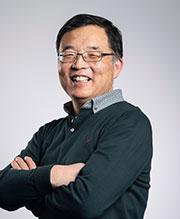
Operation Director
Professor Jianming Tang is the Director of the DSP Centre and head of the optical communications research group in the School of Computer Science and Electronic Engineering (CSEE), with expertise in optical communications systems, data networks and ultrafast nonlinearities of semiconductor optical devices. He has published approximately 300 papers and filed 8 patent portfolios. Over the past ten years, he has captured and managed >33 research grants with a total project budget of >£20m. In particular, he has co-ordinated a €3.6m EC/TSB Piano+ OCEAN project involving six academic and industrial partners, and acted as PI for a €12m EC FP7 ALPHA project with 17 academic and industrial partners involved, and Bangor’s ALPHA project budget share was approximately €1m.
Dr Roger Giddings

Deputy Operation Director
Dr Roger Giddings is a Senior Lecturer in Optical Communications and DSP in the School of CSEE, specialising in DSP-enabled optical communication systems to achieve dynamically reconfigurable optical networks that seamlessly converge metro, access and 4G/5G mobile fronthaul/backhaul. He has expertise in the real-time implementation of advanced DSP algorithms, RF/Microwave circuits, embedded systems and optical communications systems. He has 17-years R&D experience in the telecommunications industry, working for Nokia Networks, Nokia Research Centre and Nokia Ventures in both the UK and Finland. In 2007 he joined Bangor University and experimentally demonstrated the world’s first real-time Optical OFDM transmission system. He has published over 100 papers in refereed journals, including an invited tutorial paper in IEEE Journal of Lightwave Technology. He has acted as Co-Investigator for many EU and Welsh Government funded projects, acts as a reviewer for several leading journals, has given many invited talks, has acted as program chair and a TPC member for the Signal Processing in Photonics Communications (SPPCom) conference, was recently a guest editor for a special issue of the Future Internet journal and is a member of the EPSRC Peer Review Associate College.
Dr Md Saifuddin Faruk
Senior Lecturer
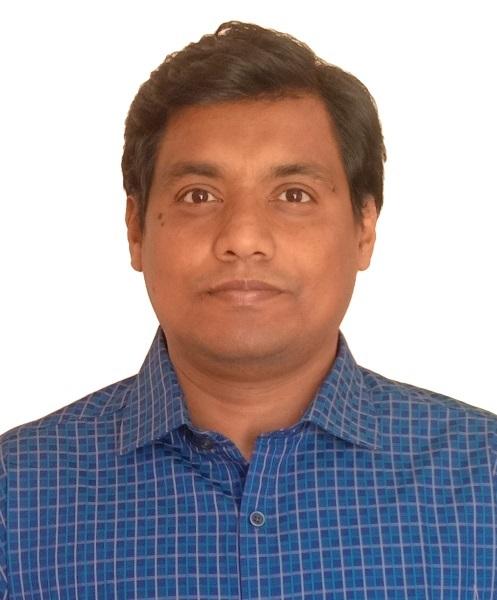
Dr Md Saifuddin Faruk is a Senior Lecturer in the School of Computer Science and Engineering. He has expertise in the DSP algorithms for coherent transceivers, high-speed optical access networks and machine learning applications for optical fibre communications. Previously, he worked as a senior research associate at the University of Cambridge, UK (2019-2023), a faculty member at DUET, Bangladesh (2004-2019) and a Marie Curie Research Fellow at the University College London (UCL) and the University of Cambridge, UK (2015-2017). He was also a short-term visiting researcher at Telekom Malaysia (TM) R&D, Malaysia, VPIphotonics GmbH, Germany, and Orange Polska, Poland. Dr Faruk has published over 50 papers in renowned journals and international conferences with several invited articles and talks. He has served as a TPC member in several IEEE/OPTICA conferences including subcommittee member of OFC-2024. He is a senior member of IEEE.
Elaine Shuttleworth
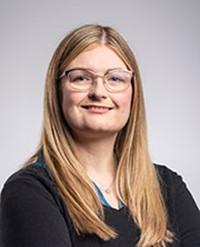
Project Administrator
Elaine manages the daily operation of the DSP Centre and its projects to ensure that their objectives are delivered successfully and that outcomes, activities, budgets and reporting to stakeholders are documented and reported appropriately. Elaine has extensive demonstrable experience in both project, programme and operation management including: proposal writing; delivery management plans; benefit framework strategies; stakeholder relationship building; budget management; all procurement activity from creating invitation to tender documents to leading tender scoring panels; report writing; risk, issue and dependency management; activity monitoring against plans; managing non-financial indicators of funded projects; and leading external evaluations. She is the Cross Cutting Themes Champion for the Centre, ensuring that themes such as equal opportunities, sustainable development, and tackling poverty and social exclusion are integrated into all activities. Elaine graduated from Bangor University’s School of Business and Regional Development in 2002 with an Upper Second-Class Honours in Business Studies and Marketing.
elaine.shuttleworth@bangor.ac.uk
Dr Wei Jin
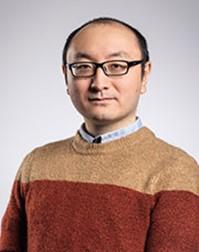
Lecturer
Dr Wei Jin is a Lecturer in the School of Computer Science and Engineering at Bangor University and a researcher at the DSP Centre of Excellence. He received his Ph.D. degree in Optical Engineering from University of Electronic Science and Technology of China in 2017. He worked as a lecturer at Southwest Petroleum University in China (2017-2018) and a postdoctoral researcher at Bangor University (2019-2021). His research interests include high-speed optical transmission systems, low-cost optical access networks, seamless optical metro-access network convergence, reconfigurable optical add/drop multiplexers and advanced DSP algorithms. He has authored and/or co-authored more than 63 publications in peer-reviewed scientific journals and international conferences.
Dr Xingwen Yi
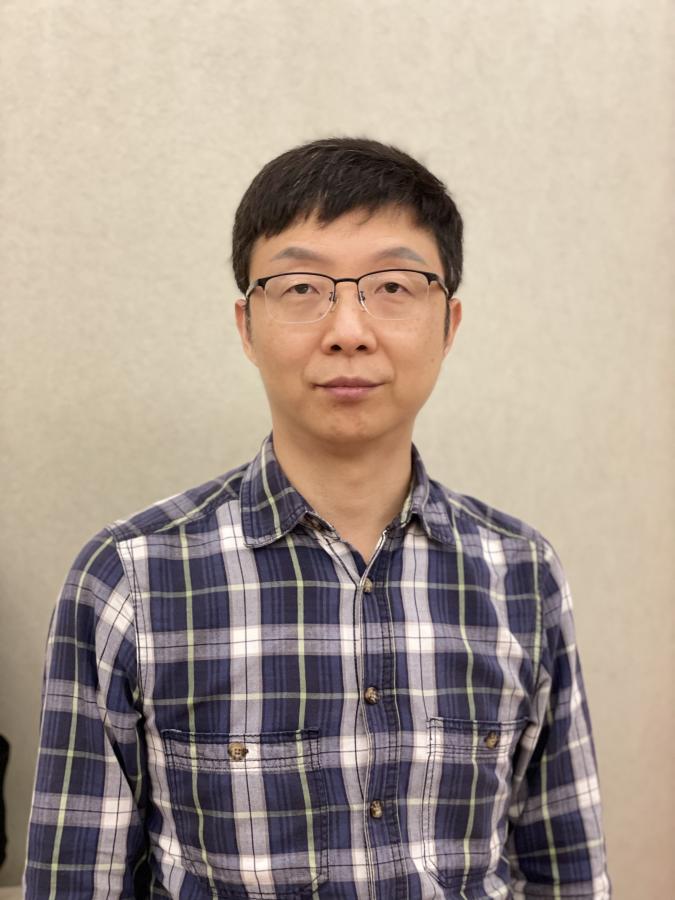
Senior Lecturer
Xingwen Yi obtained his B.Eng. degree from Southeast University, China, in 1999, and his PhD degree in Electrical and Electronic Engineering from the University of Melbourne, Australia, in 2008. He served at Huawei Technologies, Corporation, Ltd., China, from 1999 to 2004. From 2008 to 2009, he worked as a Research Scientist at the Department of Electrical and Computer Engineering, University of California, Davis, CA, USA. From 2009 to 2018, he held a position at the University of Electronic Science and Technology of China in Chengdu, China. From 2018 to 2024, he was associated with Sun Yat-sen University, China. Since 2024, he has been affiliated with the School of Computer Science and Engineering at Bangor University, UK. Dr. Yi's research interests encompass optical packet switching, electronic compensation of optical distortions, and optical performance monitoring. He is recognized as a Senior Member of IEEE and a Member of the Optical Society of America.
Dr Grahame Guilford
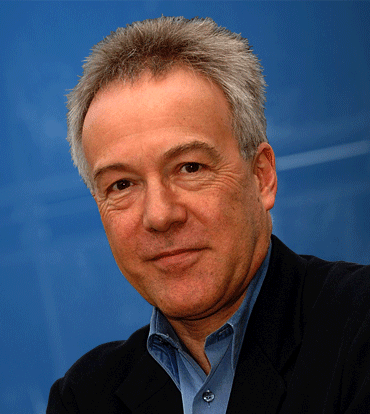
Technology Exploitation Manager
Grahame's overall responsibility is to capture R&D funding from public and private sources to increase the technology readiness levels (TRLs) of the DSP Centre-developed technologies. In addition, Grahame works closely with colleagues across the University, as well as the Centre’s industrial partners and other relevant companies to explore opportunities for commercialisation.
Mr. Omaro Gonem

Research Project Support Officer
Mr. Omaro Gonem received the B.Sc degree from the Department of Electronic Engineering, Faculty of Engineering, Benghazi University, Benghazi, Libya in 2007 and the M.Sc degree in Broadband and Optical Communications from the School of Computer Science and Electronic Engineering, Bangor University, Bangor, UK in 2018. Mr. Gonem is currently working towards the Ph.D. degree in the School of Computer Science and Electronic Engineering, Bangor University. Mr. Gonem is working on the timing aspects such as timing jitter and sampling frequency offset in hybrid OFDM-DFMA PONs. Mr. Gonem has a more than ten years professional experience in the telecommunication engineering sector. During 2008 – 2012, Mr. Gonem worked for Huawei Technologies Co., Ltd as a CS/PS Core Network Engineer.
Miss Jiaxiang He
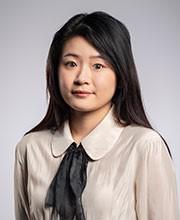
Research Project Support Officer
Jiaxiang received the degree of Bachelor of Science in Electronic Engineering from Bangor University, UK, in 2019. She is currently working towards her Ph.D. degree in Electronical Engineering in the DSP Centre of Excellence, Bangor University, UK. Her research interests include optical encryption schemes for securing optical network, passive optical network for 5G and beyond, and flexible transceivers. Her current research focuses on DSP-based physical secure communications.
Mr. Luis Vallejo

Post-Doctoral Research Officer
Mr. Luis Vallejo received the B. Sc and the M. Sc Degree in Telecommunication Engineering, communication engineering major, from Malaga University, Spain, in 2016 and 2017, respectively. During his Post-graduated Erasums program in 2017, he developed his Master Thesis, based on Low Noise Amplifiers, at Kassel University, Germany. From November 2017 to February 2018, he worked as a Test & Verification Engineer, in particular with GS-8800 and GS-9000 Test Systems and 2G/3G/A-GPS samples management, at Keysight Technologies, Málaga, Spain. In March 2018, he started his Ph.D. and joined to the Institute of Telecommunications and Multimedia Applications, Photonic Research Labs, Universitat Politecnica de Valencia, Spain. His Ph. D, under the supervision of Prof. Beatriz Ortega, is focused on microwave photonics, mmW generation, RoF/FSO for 5G and beyond, and optical access networks. During his Ph. D, he collaborated and carried out experiments based on mmW signal generation and signal transmission at Czech Technical University in Prague, Czech Republic. Since January 2022, he joined as he joined as a Postdoctoral researcher in the DSP Centre of Excellence, Bangor University, United Kindong, led by Prof. Jianming Tang. His current research focuses on mmW signal generation using free-running lasers and data transmission at mmW frequencies over hybrid optical (fiber/FSO) and electrical (wireless) links. He can be contacted at l.vallejocastro@bangor.ac.uk
Mathew Purnell
Project Support Officer
Mathew completed a full-time summer placement with the DSP Centre in 2022 before successfully securing a fixed contract alongside his Master's degree. During his time at the DSP Centre, Mathew assisted our the research team to develop two of our portable demonstrator systems for our innovative technologies; "Physical Layer Secure Optical Network" and "Distributed Fibre Optic Sensing". Mathew's role involved tasks such as component selection, designing component layouts for enclosures, assembling demo systems, testing the demonstrator functionality and performance, and developing user instructions. He has also supported the realisation of our new demonstration room, by supporting our researchers to install and test our specialist equipment, and implement protective monitoring systems.
Mathew completed a Master's in 'Control and Instrumentation Engineering' within the School of Computer Science & Electronic Engineering at the university, graduating with a 1st Class in 2023. Mathew now works as the DSP Centre Project Support Officer, where is main responsibilities are to support the research team with the design and development of prototypes and field trials, operating and maintaining lab equipment, and assisting with the set-up and running of demonstrations at internal and external events.
Current students
Jasmine Parkes

Master's student
Jasmine completed a Bachelor of Engineering (BEng) degree in Electronic Engineering at Bangor University, graduating in 2022 with a First-Class Honours. Jasmine successfully secured a HEFCW studentship with the DSP Centre in 2022, where she is now studying towards a Master of Science by Research (MScRes) degree in Sensing Optical Networks Integrated Communications (SONIC). She is focusing on the integration of real-time Distributed Fibre Optics Sensors (DFOS) with data transmission on the same wavelength.
Previous students
David Batty
David completed a summer placement with the DSP Centre in 2022, working on Demonstrator System Development and Lab Measure Automation.
We are the only DSP Centre laboratory in the UK. Thanks to our state-of-the-art equipment, worth £3.5 million (increasing to £5.5m in 2024), our facilities offer a unique opportunity for students to gain valuable practical experimentation experience to support theoretical research activities. Keep an eye out for undergraduate student placements, MEng/PhD opportunities and well as academic roles in the News & Events section below.
If you are looking to pursue a PhD degree in a relevant area and have received funding to support this, please contact us using the details at the bottom of the page with your CV, research proposal, and confirmation of funding, and we will be happy to discuss further.
DSP Centre of Excellence School of Computer Science and Electronic Engineering Bangor University Dean Street, Bangor Gwynedd LL57 1UT
CentreDSP
Canolfan Rhagoriaeth DSP Centre of Excellence

